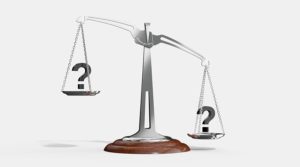It’s Halloween and we indulge in make-believe scary moments and call it fun. In real life, fear isn’t so fun. People up to their eyeballs in debt are scared witless by the thought of filing bankruptcy. It frightens them more than haunted houses, ghouls, and blood-soaked bodies. So really: what’s so scary about filing bankruptcy? […]
The Biggest Bankruptcy Mistake You Can Make
The biggest bankruptcy mistake has nothing to do with choice of chapter, exemptions, disclosure, or attorneys. It has to do with timing. The biggest bankruptcy mistake is waiting too long to consider bankruptcy. Time is seldom your friend What’s wrong with letting time pass before making a momentous decision? Doesn’t time heal most wounds? No, […]
Debt Actually Makes You Stupid
It’s easy to tell ourselves that getting into debt was stupid. Maybe, maybe not. Lots of debt happens without making bad decisions. Think of medical bills. Natural disasters. Divorce. But regardless of how you got in debt, there’s more bad news. Just being in debt makes you stupid. Stupid, as in, your IQ goes down […]
Bankruptcy Alternatives Cost More, Deliver Less
Everyone wants a solution to their debt problems without bankruptcy. But the truth is, bankruptcy alternatives often suck. The on-line story of one customer of a debt settlement company particularly sticks with me. Using the “services” of this company, the poster now has six new judgments of record and two garnishments in process. The debt […]
Fear keeps folks from bankruptcy relief
Fear of bankruptcy is both common and necessary. Those who aren’t living the American dream of upward mobility and financial security seem to think that’s a matter for shame. Perhaps the second most frequent question would-be clients ask me is whether the fact that they filed bankruptcy will be [The answer is that it’s unlikely.] […]
Don’t Tidy Up Before Seeing A Bankruptcy Lawyer
Don’t tidy up your financial affairs before consulting a bankruptcy lawyer to plan for bankruptcy. Your current mess may present opportunities to plan your case for a better outcome. You may waste money or lose bankruptcy options when you make last minute changes to your situation without understanding how that situation plays out in bankruptcy. […]
The Real Importance of Your Credit Score
Getting credit after bankruptcy is the most frequent search term that bring visitors to Bankruptcy in Brief, my encyclopedic sister site on bankruptcy. In these visitors’ minds, the impact of bankruptcy on their credit score is critical. It’s ironic that readers, saddled with enough debt to consider bankruptcy, worry about their credit score. After all, […]
Client “wants to think” before getting good bankruptcy information
The caller with a pending foreclosure sale called and canceled an initial consultation with me last week. He wanted to “think about it” before coming in. Huh? Think about being homeless? Think about the cost of getting relief through bankruptcy? Think about confronting a dire situation? It was almost as if gathering information about options […]
Damaged Credit Heals
Will filing bankruptcy hurt my credit? Probably. [Keep reading, there’s more.] Should that hit to your credit keep from filing bankruptcy? Not by a long shot. Incredibly, I encounter people drowning in debt who think their credit report is more important than their financial health. Their thinking seems to be that credit, once damaged, is never […]
When Is The Time Right To File Bankruptcy
Just like stand-up comedy and batting in baseball, filing bankruptcy is all about timing. Timing your bankruptcy filing is no different. File bankruptcy too early, or too late, and you risk losing assets or advantages that better timing could have assured. Admittedly, you don’t always have the luxury of filing bankruptcy on your own schedule. […]
- « Previous Page
- 1
- 2
- 3
- 4
- …
- 6
- Next Page »










